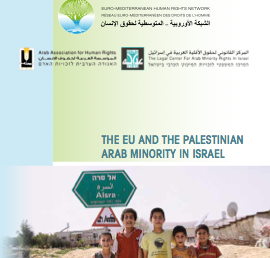Proposed JNF land exchange policy is discriminatory
On 18 June 2005, Adalah sent a letter to Israel's Prime Minister Ariel Sharon and the Attorney General (AG) Menachem Mazuz, calling on them to reject the Gadish Committee's recommendations to exchange state-held land in the Galilee and the Naqab (Negev), in the north and south of Israel respectively, for land of equal value held by the Jewish National Fund (JNF) in the center of the state. Adalah argued that such a transferal would violate the rights of Palestinian citizens of Israel and exacerbate the discrimination they face in accessing lands. Adalah further contended that the discriminatory division of land between Jewish and Arab local authorities, which creates severe housing and residential shortages, also prevents Arab communities from developing and thereby contributes to the poor socio-economic status of Arab towns and villages.
The Gadish Committee, headed by the late Yaacov Gadish, was established on 2 May 2004, by Minister of Industry, Trade and Labor Ehud Olmert with the aim of investigating reforms in the Israel Lands Administration (ILA).
On 19 June 2005, the Israeli government approved the recommendations of the Gadish Committee. The Committee's report is now due to come before the Israel Lands Administration Council for its approval.
In the letter to the Prime Minister and the AG, Adalah Attorney Suhad Bishara and Adalah's Urban and Regional Planner Hana Hamdan argued that a public resource such as land should not be transferred to the JNF, a discriminatory body that openly admits that it works for the benefit of a particular group, the Jewish community, and does not have a duty to practice equality toward all citizens of the state of Israel. Such a transferal violates the constitutional right to dignity, and the principles of equality and sustainable development.
Adalah argued that the result of transferring state land in the Galilee and the Naqab to the JNF would result in Arab citizens of Israel being denied their rights in these lands. The JNF currently holds 13% of all ILA-administered "Israel Lands" on behalf of Jewish people worldwide. Non-Jewish citizens of Israel are prohibited from leasing or purchasing land held by the JNF. Consequently, Palestinian citizens of Israel are barred from accessing any of this land. Encouraging the perpetuation of such segregationist land and planning policies contributes to the institutionalization of apartheid-like settlements, in which citizens of Israel are divided according to ethnic criteria.
Since the Arab minority of Israel lives primarily in the Galilee and the Naqab regions of the state, if implemented, the recommendations of the Gadish Committee would be particularly harmful to them, Adalah emphasized.
Some 55% of Palestinian citizens of Israel live in the Northern District of Israel, comprising over half the district's population (51.8%). A further 12.8% of Palestinians live in the Southern District, comprising over 14% of the population.
The majority of Arab towns and villages in Israel (65%, excluding "mixed" cities and unrecognized villages) are located in the Northern District. In the Southern District, only 14 Arab towns, or townships, have achieved recognition from the state – seven of which only achieved recognition in the last couple of years. Throughout the Naqab, at least 40 unrecognized villages currently exist, in which some 70,000 Arab Bedouin citizens of Israel live.
As Adalah argued in its letter:
These factors, in addition to the background of massive expropriation of land that occurred in previous years, mean that any further prohibition or limitation of land use directed at the Arab population through the transferal of land to the JNF, or in any other manner, would result in a further deterioration of the above-mentioned conditions, the exacerbation of continuing discrimination against this community and the thwarting of their development in these districts.
















